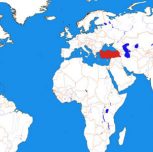Turkey’s investment legislation is simple and complies with international standards, while it offers equal treatment for all investors. The backbone of the investment legislation is made up of the Encouragement of Investments and Employment Law No. 5084, Foreign Direct Investments Law No. 4875, the Regulation on the Implementation of the Foreign Direct Investment Law, multilateral and bilateral investment treaties and various laws and related sub-regulations on the promotion of sectorial investments.
Legal Framework of Foreign Direct Investment
- Foreign Direct Investment (FDI) Law No. 4875
The aim of the Foreign Direct Investment (FDI) Law No. 4875 is:
- to encourage FDI in the country
- to protect the rights of investors
- to align the definitions of an investor and investment with international standards
- to establish a notification-based system rather than an approval-based one for FDI
- to increase the volume of FDI through streamlined policies and procedures
The FDI Law provides a definition of foreign investors and foreign direct investments. In addition, it explains important principles of FDI, such as freedom to invest, national treatment, expropriation and nationalization, freedom of transfer, national and international arbitration and alternative dispute settlement methods, valuation of non-cash capital, employment of foreign personnel, and liaison offices.
The Regulation on the Implementation of the FDI Law consists of specifying the procedures and principles set forth in the FDI Law. The aim of the FDI Law with regard to the work permits for foreigners is:
- to regulate the work carried out by foreigners
- to stipulate the provisions and rules on work permits given to foreigners
- Bilateral Agreements
- a. Bilateral Agreements for the Promotion and Protection of Investments
Bilateral Agreements for the Promotion and Protection of Investments were signed from 1962 onwards with countries that show the potential to improve bilateral investment relations. The basic aim of bilateral investment agreements is to establish a favorable environment for economic cooperation between the contracting parties by defining standards of treatment for investors and their investments within the boundaries of the countries concerned. The aim of these agreements is to increase the flow of capital between the contracting parties, while ensuring a stable investment environment. In addition, by having provisions on international arbitration, they aim to prescribe ways to successfully settle disputes that might occur among investors and the host state. Turkey has signed Bilateral Investment Treaties with 94 countries. However, Turkey is a dualist country, where an international treaty has to be ratified and promulgated in order to become part of the national legal system. Within this regard, 75 Bilateral Investment Treaties out of these 94 have gone into effect so far.
75 countries
Afghanistan, Albania, Argentina, Australia, Austria, Azerbaijan, Bangladesh, Belarus, Belgium-Luxembourg, Bosnia and Herzegovina, Bulgaria, China, Croatia, Cuba, Czech Republic, Denmark, Egypt, Estonia, Ethiopia, Finland, France, Georgia, Germany, Greece, Hungary, India, Indonesia, Iran, Israel, Italy, Japan, Jordan, Kazakhstan, Kuwait, Kyrgyzstan, Latvia, Lebanon, Libya, Lithuania, Macedonia, Malaysia, Malta, Moldova, Mongolia, Morocco, Netherlands, Oman, Pakistan, Philippines, Poland, Portugal, Qatar, Romania, Russian Federation, Saudi Arabia, Senegal, Serbia, Singapore, Slovakia, Slovenia, South Korea, Spain, Sweden, Switzerland, Syria, Tajikistan, Thailand, Tunisia, Turkmenistan, Ukraine, United Arab Emirates, United Kingdom, United States of America, Uzbekistan, Yemen
Source: Ministry of Economy
- b. Double Taxation Prevention Treaties
Turkey has signed Double Taxation Prevention Treaties with 80 countries. This enables tax paid in one of two countries to be offset against tax payable in the other, thus preventing double taxation.
80 countries
Albania, Algeria, Australia, Austria, Azerbaijan, Bahrain, Bangladesh, Belarus, Belgium, Bosnia and Herzegovina, Brazil, Bulgaria, Canada, China, Croatia, Czech Republic, Denmark, Egypt, Estonia, Ethiopia, Finland, France, Georgia, Germany, Greece, Hungary, India, Indonesia, Iran, Ireland, Israel, Italy, Japan, Jordan, Kazakhstan, Kuwait, Kyrgyzstan, Latvia, Lebanon, Lithuania, Luxembourg, Macedonia, Malaysia, Malta, Moldova, Mongolia, Morocco, Netherlands, New Zealand, Norway, Oman, Pakistan, Poland, Portugal, Qatar, Romania, Russian Federation, Saudi Arabia, Serbia and Montenegro, Singapore, Slovakia, Slovenia, South Africa, South Korea, Spain, Sudan, Sweden, Switzerland, Syria, Tajikistan, Thailand, Tunisia, Turkish Republic of Northern Cyprus, Turkmenistan, Ukraine, United Arab Emirates, United Kingdom, United States of America, Uzbekistan, Yemen
Source: Revenue Administration
Turkey is continuing to expand the area covered by the Double Taxation Prevention Treaty by adding more countries on an ongoing basis.
- c. Social Security Agreements
Turkey has signed Social Security Agreements with 26 countries. These agreements make it easier for expatriates to move between countries. The number of these countries will increase in line with the increased sources of FDI.
26 countries
Albania, Austria, Azerbaijan, Belgium, Bosnia and Herzegovina, Bulgaria, Canada and the Province of Quebec, Croatia, Czech Republic, Denmark, France, Georgia, Germany, Libya, Luxembourg, Macedonia, Netherlands, Norway, Romania, Slovakia, Serbia, South Korea, Sweden, Switzerland, Turkish Republic of Northern Cyprus, United Kingdom
Source: Social Security Institution (SSI)
- Customs Union and Free Trade Agreements (FTA)
A Customs Union Agreement between Turkey and the European Union has been in effect since 1996. The agreement allows trade between Turkey and the EU countries without any customs restrictions. The EU-Turkey Customs Union is one of the steps toward full Turkish membership of the EU itself.
Turkey has FTAs with 37 countries, creating a free trade area in which the countries agree to eliminate tariffs, quotas and preferences on most goods and services traded between them. This framework explains why many global companies are now using Turkey as a second supply source and manufacturing base, not only for the EU and rapidly growing Turkish markets, but also for the Middle East, Black Sea and North African markets, with the added advantage of a relatively low-cost but well-educated labor force, coupled with cost-effective transportation.
37 countries
Albania, Bosnia and Herzegovina, Egypt, Georgia, EFTA, Israel, South Korea, Macedonia, Morocco, Malaysia, Mauritius, Palestine, Jordan, Syria*, Tunisia, Montenegro, Serbia, Chile
Countries that have finalized the negotiation process: Faroe Islands, Ghana, Kosovo, Lebanon, Moldova, Singapore
Countries in the negotiation process: Democratic Republic of the Congo, Cameroon, Colombia, Ecuador, Gulf Cooperation Council, Japan, Libya, Mexico, Mercosur, Peru, Seychelles, Ukraine
*suspended
Source: Ministry of Economy










